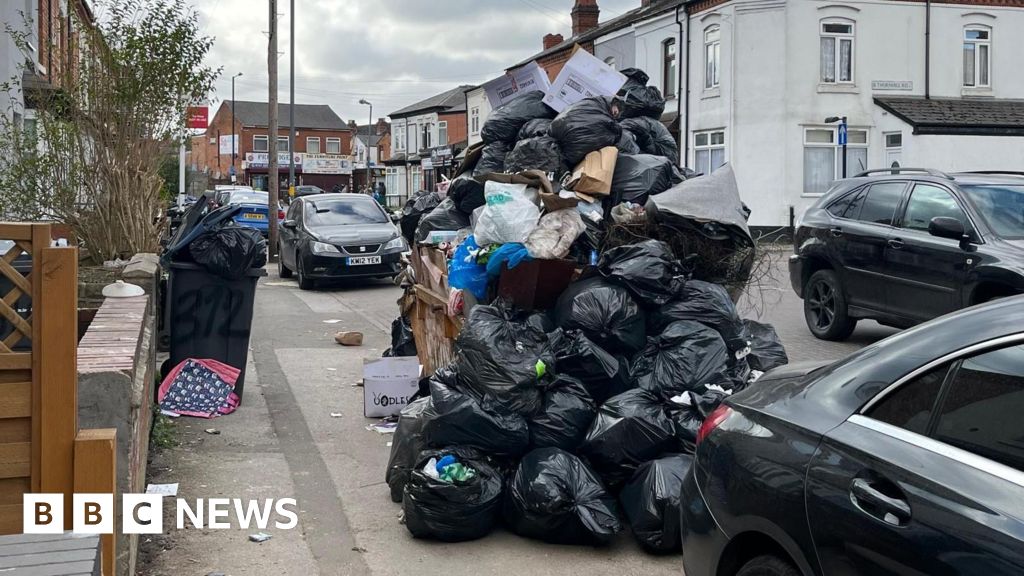Bin Strike in Birmingham Exposes Socioeconomic Divide

In Birmingham, the ongoing bin strike has entered its sixth week, leaving many of the citys 1.2 million residents grappling with the consequences of uncollected waste. As the UK's second-largest city, Birmingham encompasses over 400,000 households, yet the impact of this industrial action has not been felt uniformly across its diverse neighborhoods. The stark contrast in waste management issues has highlighted a growing divide between wealthier and poorer areas, particularly as waste piles up in densely populated inner-city locales, while affluent suburbs remain relatively unaffected.
For instance, in Balsall Heath, the streets are choked with rubbish to the extent that pedestrians find it difficult to navigate. Conversely, just a few miles away in the wealthy area of Harborne, residents find their wheelie bins neatly lined up and free of any overflow. Negotiations between the city council and the Unite union aimed at resolving the strike have stalled, with discussions set to resume next week after a lack of agreement was reached on Wednesday. The labor dispute began when workers were informed of proposed downgrades and pay cuts; in January, members of Unite initiated one-day walkouts, which escalated into a full-blown strike involving over 300 workers on March 11.
In the initial weeks of the strike, the impact was mitigated as striking workers employed delaying tactics. They effectively obstructed the exit of operational vehicles from the citys three main depots, which were staffed by non-union members and agency personnel. Strikers would walk slowly in front of departing trucks, significantly reducing the number of daily bin collections; in fact, by early April, only about 10% of the usual collections were completed, resulting in a staggering accumulation of approximately 22,000 tonnes of uncollected waste.
The visible repercussions of the strike are most apparent in Birminghams most deprived wards, including Small Heath, Sparkbrook, and Ladywood. These areas, characterized by Victorian terraced houses and high population density, face substantial waste management challenges. Many residents lack access to vehicles to transport their rubbish to disposal sites, leading to larger and more unsightly refuse piles on the streets. Semir Said, the senior outreach project manager at Green Lane Mosque, expressed his concern over the growing rat population in the area, noting, "Piles of rubbish, mountains of rubbish really in streets inner city Birmingham, so yeah a very, very big problem." He lamented the inequity in service provision for poorer neighborhoods.
In contrast to the frustration felt in areas like Small Heath, communities in wealthier districts have been largely insulated from the consequences of the strike. For those in need of disposal options, alternative solutions have emerged, such as organizing community clean-ups. Sadia Khan, chair of Friends of Sparkgreen Park, has spearheaded efforts to address litter accumulation, although she feels that their impact has diminished amid the ongoing crisis. "It feels like the litter picks aren't making any difference," she stated, adding that the situation has become increasingly disheartening.
Resident concerns have further been compounded by anecdotal reports of fly-tipping, with some claiming that waste from other neighborhoods is being dumped in their communities. Naz Khan, who previously assisted during a similar strike, observed that this ongoing issue has been exacerbated by people traveling from elsewhere to unload their rubbish. Many residents have expressed frustration over a perceived two-tier waste collection system, where wealthier areas receive more regular service, leaving poorer districts to struggle.
As the strike progressed, local residents began to voice their dissatisfaction with the service they receive. Reports of the awful smell from overflowing bins led some individuals to avoid going outside while others complained of health issues exacerbated by poor waste management. Alexandra Giddings, who lives near Ladypool Road, described the stench as "horrendous," highlighting the impact on her son who suffers from chronic asthma. Despite recent efforts from the council to resume services and a temporary uptick in collections, the smell and mess from overflowing bins continue to plague her neighborhood.
In a bid to alleviate the waste crisis, West Midlands Police intervened to curb the strike's delaying tactics, permitting a larger number of working trucks to complete their routes. With the assistance of army logistics experts, a significant clear-up operation has commenced, and the council indicated that the backlog of waste should be resolved shortly. However, the lingering presence of uncollected refuse continues to tarnish Birmingham's reputation. As one striking worker, Dave, expressed, "We really apologize... were going to make every effort to come back to work as soon as possible and collect the bins again." While the strike's resolution may be on the horizon, the underlying socioeconomic disparities it has illuminated remain a pressing concern for the city's future.


























